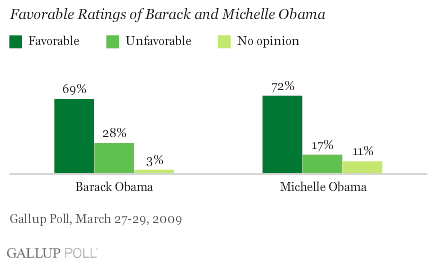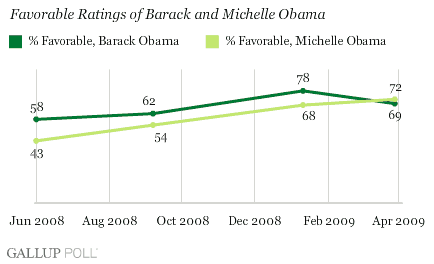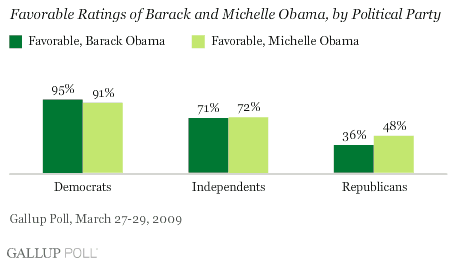PRINCETON, NJ -- Americans have very positive impressions of both President Barack Obama and first lady Michelle Obama. But in the latest Gallup Poll, Mrs. Obama receives a slightly better favorable rating, 72% to 69%.

While the three percentage-point difference between the two favorable ratings is not statistically significant, Michelle Obama's much lower unfavorable ratings compared with the president's (17% vs. 28%) give her the clear edge in public favorability.
These results are based on a March 27-29 Gallup Poll. Compared to the last time Gallup asked Americans for their basic views of the Obamas -- in January, just before Inauguration Day -- Mrs. Obama's rating has improved, while her husband's has gone down. But the president's 78% favorable rating in January -- perhaps inflated by the excitement about his pending inauguration -- ranks among the highest Gallup has recorded since it began measuring popularity using this format in 1992. So even as his rating has settled down to 69%, he remains very popular.

It is not uncommon for first ladies to be more popular than their husbands, in terms of either their favorable ratings or their job approval ratings. To illustrate, Laura Bush averaged a 71% favorable rating from 2001-2009, compared to George W. Bush's 56% average. The greater popularity of first ladies likely reflects that their role is far less controversial than that of the president, which often results in less partisan ratings of the first lady.
That pattern is evident in the current data. While Democrats and independents rate the president and first lady similarly, Republicans have a more positive view of Michelle Obama than of Barack Obama. Of course, Republicans are not as positive toward either of the Obamas as are Democrats or independents.

Presidential Favorability vs. Job Approval
The president's 69% favorable rating also exceeds his job approval rating, which has mostly been in the low 60% range since he took office. Again, that is also typical -- presidents usually receive higher favorable ratings (which assess their likability) than job approval ratings (which ask for a job-performance evaluation). There is a notable exception to this general pattern, however. After the Monica Lewinsky scandal broke, Americans had much more positive feelings about the job Bill Clinton was doing as president than about him as a person. Prior to the scandal, the opposite was true.
Survey Methods
Results are based on telephone interviews with 1,007 national adults, aged 18 and older, conducted March 27-29, 2009. For results based on the total sample of national adults, one can say with 95% confidence that the maximum margin of sampling error is ±3 percentage points.
Interviews are conducted with respondents on land-line telephones (for respondents with a land-line telephone) and cellular phones (for respondents who are cell-phone only).
In addition to sampling error, question wording and practical difficulties in conducting surveys can introduce error or bias into the findings of public opinion polls.
